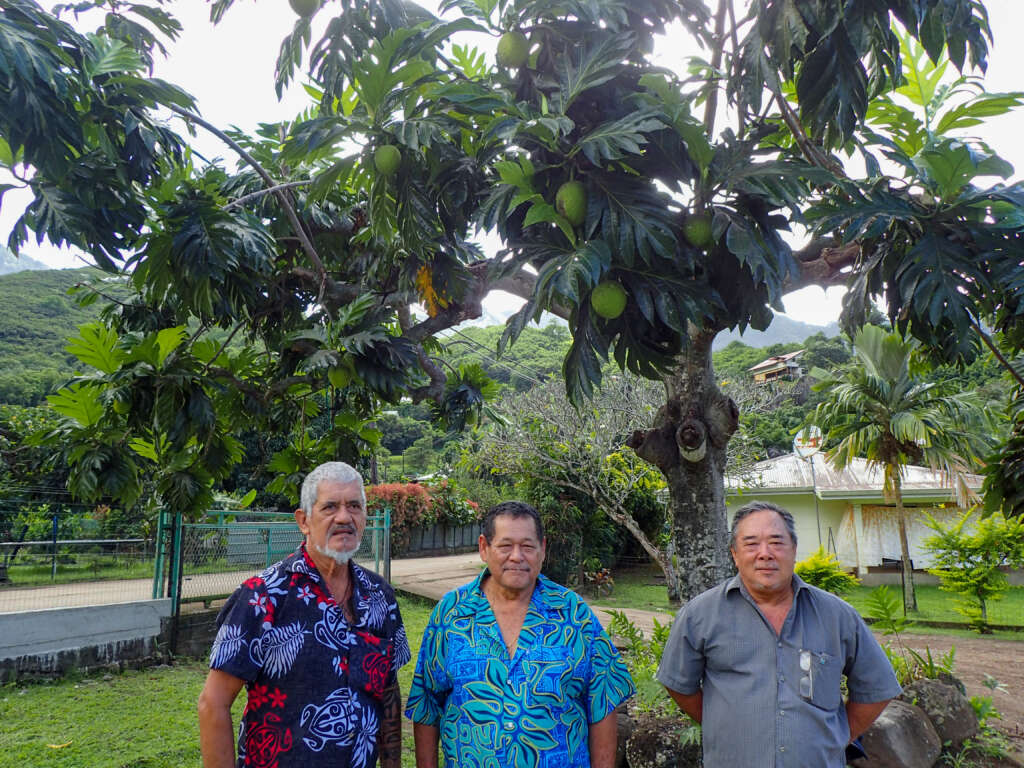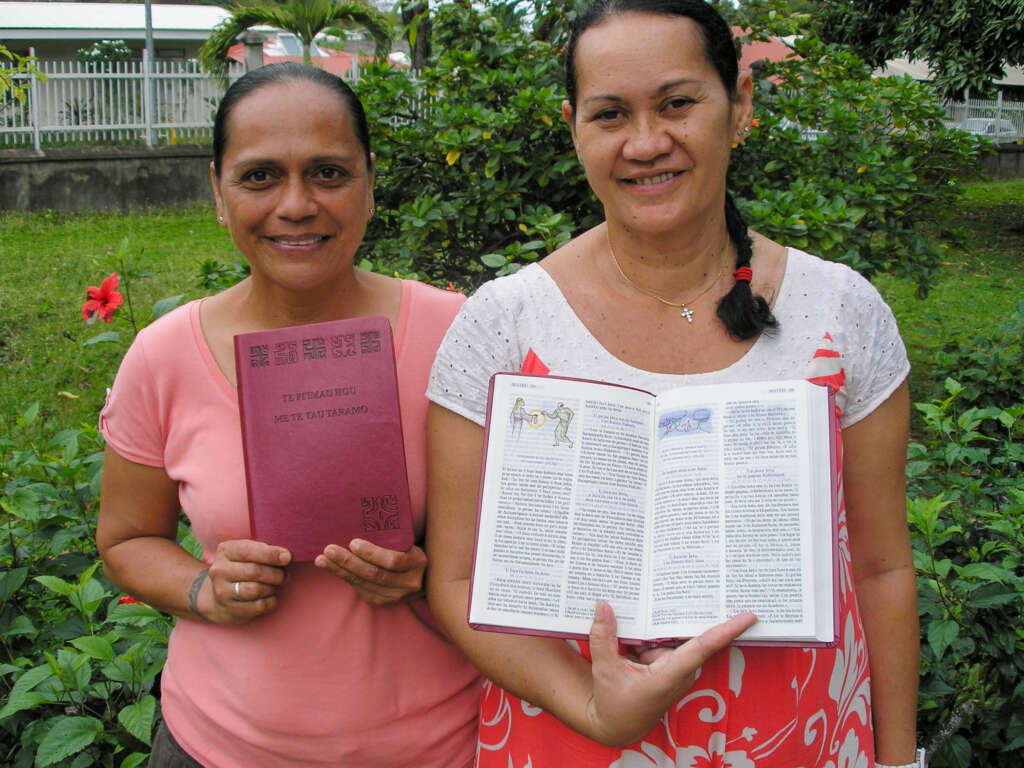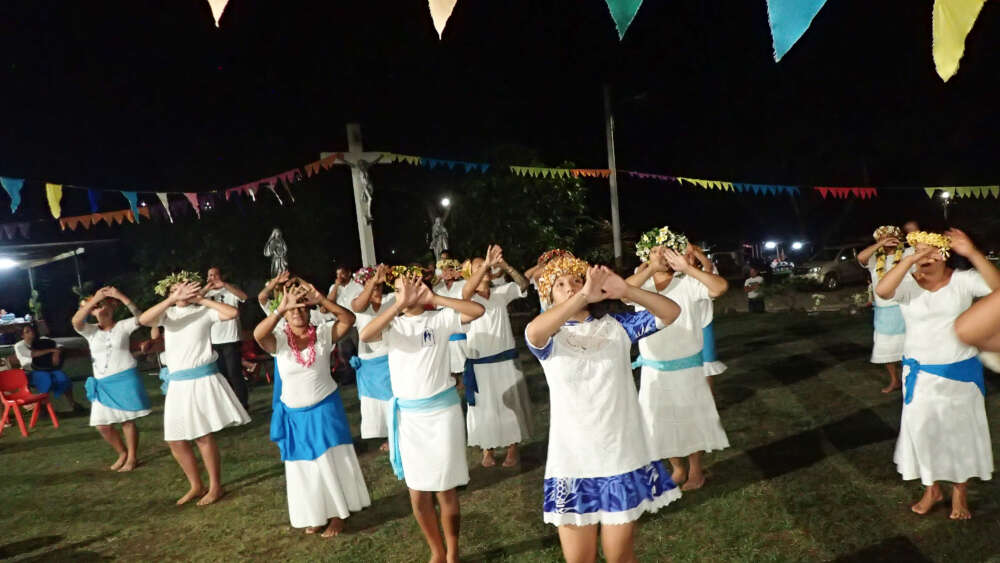“We Marquesas Islanders have been Christians for over 150 years but we do not yet have the full Bible in our language,” says Jacques Mendiola, 74.
The Marquesas Islands, a group of 12 volcanic islands in French Polynesia, is one of the most remote island groups in the world. Located around 1500km northeast of Tahiti, the islands are famed for their soaring mountain peaks, dramatic cliffs and beautiful bays.
Unlike the rest of French Polynesia, where the Tahitian language is widely spoken, the nearly 10,000 inhabitants of the Marquesas Islands speak their own language, Marquesan (many also speak French). Marquesan-speakers are proud of their language and unique culture, which includes tattoo art and distinctive wood carvings.
Christianity is a big part of their identity and they warmly welcomed the New Testament with Psalms in their language in 1995, followed by a revision in 2015. Work on the Old Testament with Deuterocanon began in 1996 and Jacques Mendiola, a retired school teacher who lives on the island of Hiva Oa, was delighted to join the project in 2018.
Future generations
As well as being very active in his Christian faith and in the life of his church, Jacques is glad to be involved in helping to preserve his language for future generations. Over the years he has seen the declining use of the Marquesan language among young people, and he wants to help revive it.
“I am thankful to God for the opportunity to help with the Marquesan Bible project in recent years, translating the text and improving its language style,” he smiles. “We are grateful for the support of the Bible Society of the South Pacific in this important work.”

Jacques (right) with the other translation team members under a breadfruit tree. Joseph Hong
Jacques’ background and early life experiences have given him a particular passion for this work. Born to a young, single mother after she had a brief affair with a young man from China who was visiting the Marquesas Islands, he never knew his father. But he and his mother, who later married and had six other children, were very close. He was devastated when he lost her.
“When I was 13, I was sent to a boarding school on another island. One day, while I was playing in the school courtyard, the principal came and read me a letter, announcing that my mother had died a week earlier, while giving birth to her eighth child. This had happened on Fatuiva, a small island of about 400 inhabitants without adequate medical facilities.
Wept every day
“It was a big shock to me – one from which I could hardly recover,” Jacques recalls. “I wept every day for at least a month. I literally became an orphan, though I was surrounded by stepbrothers and stepsisters, and I had grandparents to look after me.”
Their support enabled Jacques to continue and excel in his education, and he went on to attend a teaching college in Tahiti. After graduating he returned home, got married and started a family, and enjoyed a fulfilling teaching career, passing his knowledge onto young Marquesans.
For Jacques, who has nine children and 20 grandchildren, having the whole Bible in Marquesan will help his fellow islanders to understand God’s word more deeply and help to preserve and even grow the use of the language for future generations.
“In spite of my mixed ancestry, I feel fully Marquesan and my mother tongue is the distinct Marquesan language,” he says. “When I read the Bible in French, it is difficult to understand due to my limited knowledge of the French language.
“When my grandchildren read the Bible in French and find they can’t fully understand it, they will be able to turn to the Marquesan Bible. This Marquesan Bible will serve as a basis for the language, and help young people to master it.”
Marquesan: a language that survived against the odds
When the first Europeans visited the Marquesas Islands toward the end of the 18th century, the population was estimated at 30,000-100,000. But, due to imported diseases, which killed many islanders, and others falling victim to ‘blackbirding’ (the kidnapping of Pacific islanders by European colonists for use as slaves or labourers on plantations) the population steeply declined. By the early 20th century, there were only about 2,000 Marquesans left.
In the early 19th century, Protestant, then Catholic, missionaries came to live on the Marquesas Islands to preach the gospel. They taught the islanders to pray and produced a prayer booklet in their language, with a syllabary containing five vowels and 10 consonants of the Marquesan language.

Marquesan women proudly holding the Revised Marquesan New Testament with Psalms, published in 2015.
By 1905, a draft of the Marquesan New Testament was completed but never published. The rapid depopulation of the Marquesas Islands led to the belief that Marquesan speakers were a dying people.
“The Marquesan is a language that will be no more,” wrote Ildefonse-René Dordillon in his book, Grammaire et Dictionnaire de la Langue des Îles Marquises (Grammar and Dictionary of the language of the Marquesas Islands). “But while this people is going to be extinct, ethnographers and linguists will even more appreciate the documents of a language that is no longer spoken.”
Thankfully, Dordillon’s prediction did not come true and, today, Jacques and the other translators use his book as a reference as they complete the full Marquesan Bible.
Work on the Marquesan Old Testament and Deuterocanon is close to completion but the final checking has been delayed by the COVID-19 pandemic. Please pray that this project will soon be able to move forward so that the people of the Marquesas Islands will have access to the whole Bible in their language.
Email This Story
Why not send this to a friend?


